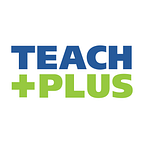Marcela Alvarez, Teach Plus California Emergent Bilingual Change Agent Fellow
Establishing a teacher learning community to collaborate, share best practices, and calibrate lessons with standards
My name is Marcela Alvarez and I am a Teach Plus Emergent Bilingual Change Agent Fellow. I am also a first-generation college graduate and the daughter of Mexican immigrants. I have taught bilingual students in different programs across four schools and two states. Today, I teach at Gratts Primary Center in Los Angeles, California. The Center serves students who are English Language Learners, many of whom are immigrants or children of immigrants. Data is important for all students, but it is especially important when it comes to creating successful educational experiences for students learning English. As a bilingual educator, I have come to appreciate the power of data to dive instruction for my students.
My experience with Simon, a newcomer from Guatemala, illustrates this. Simon came to the United States prior to starting kindergarten; while he spoke very little English, he was making progress up until the pandemic. When I reached out to his mother in September 2020 to discuss the fact that Simon had not been able to identify all the letters in the alphabet or provide their sound, she was deeply concerned. She was worried that her son wasn’t prepared for first grade’s content and nervous that I would not want to support him since he was not at grade level. However, as Simon demonstrated growth with each monitoring cycle and benchmark testing period, she began to feel better and better. In other words, our data was telling Simon’s mom that he was growing and making progress. Unfortunately, his growth did not meet grade level standard.
At my school site, data such as Dynamic Indicators of Basic Early Literacy Skills (DIBELS) is used to determine student grades. If students like Simon are not meeting grade level benchmarks, then they are not able to earn the grades which demonstrate mastery. For example, because Simon initially struggled with segmenting words into their sounds, he was unable to meet the grade level expectation for “Segment spoken single-syllable words into their complete sequence of individual sounds.” Because of this policy, Simon was unable to earn the grades that his mother felt he deserved. During each parent conference, there was contention and confusion. I explained our policy to Simon’s mom, pointing out that completing work was a factor but that Simon still needed to demonstrate mastery of the benchmarks. And at each grading cycle and parent conference period, I explained that although Simon did not meet grade level mastery, he made significant growth. Both Simon and his mother could be proud of that. Instead, they felt frustrated.
Although the logic of our school’s policy makes sense, a policy doesn’t work if it discourages students instead of celebrating their achievements. While the ultimate goal is for all students to meet grade level mastery and benchmarks, all student growth should be celebrated. Teachers need to support students by celebrating their growth for long term success, so that students develop their own self-efficacy as life-long learners. To accomplish this, we need a shift in school culture. Before the parent conferences, I would always reflect on how I should review student progress with all our families, because they needed to be aware of what progress their children were making, despite the policy-driven setbacks.
This reflection was the genesis of my Teach Plus Change Agent project, the goal of which is to establish learning communities at my school in which we not only collaborate amongst the teachers but also incorporate all our staff who support children in their learning. Through these teacher learning communities, I hope to build capacity amongst our staff to not only share best practices and calibrate lessons with the standards, but also to build a sustainable practice through which the school staff reflects on student data and growth. The practice would acknowledge the needs to get our students to mastery, while providing the means for teachers, students, and parents to see the growth that students like Simon have made even when they have not necessarily met that mastery.
The way to make my Change Agent project successful at my school is through teacher leadership, in which the staff collaborate to develop these practices. To accomplish this goal, I am leading a group of teachers in meeting monthly to read and understand the English Learner Roadmap, align our lesson plans to the EL standards, and to discuss our individual and collective best practices in explaining data to students and their families.
By the end of the school year, Simon mastered some standards and was able to apply the skills he had learned to his writing and reading. At Simon’s final parent conference, Simon’s mom and I reviewed the data and as his progress became evident to her, she was beaming. It is time to establish a culture in which teachers can center the growth in student data, and to celebrate student achievement, even as they work towards grade-level benchmarks.
